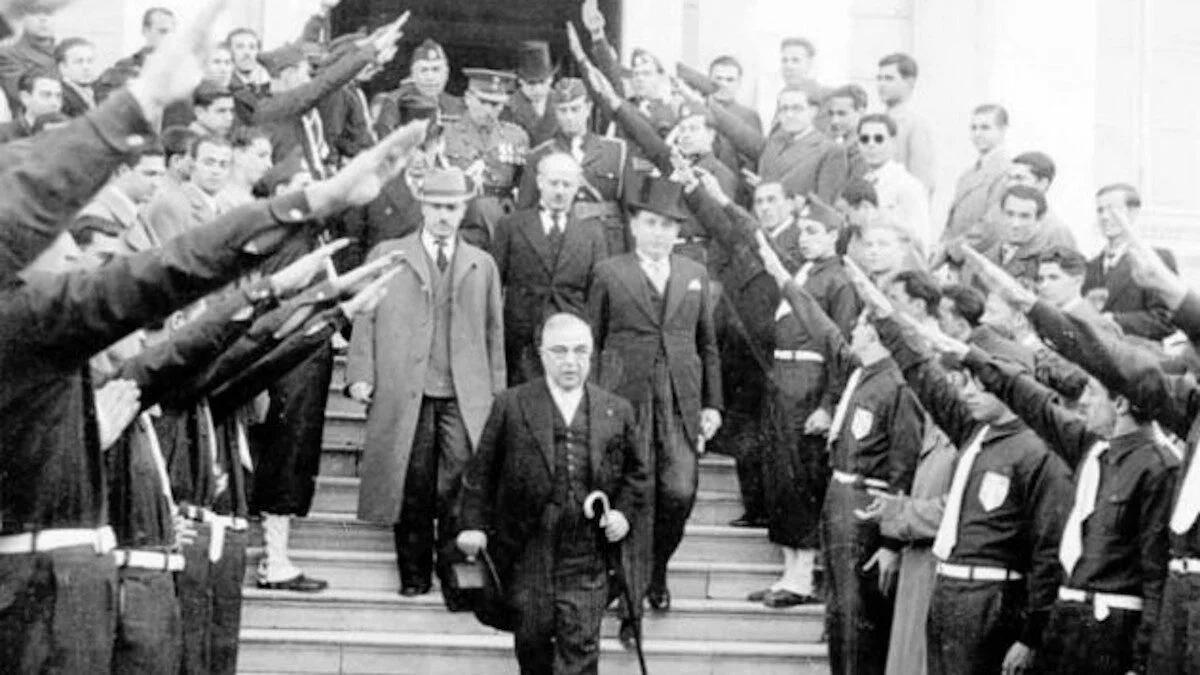The Youth Organization of National Youth (Ethniki Organosis Neolaias, or EON) was a central pillar of Ioannis Metaxas’ regime (1936–1941) in Greece. It emerged as the largest nationalist youth organization in the nation’s history, mobilizing over 1,250,000 members at its peak. This article examines the establishment, structure, and impact of EON, highlighting its role in shaping a new national identity while reflecting on its historical significance.
Origins of EON
Ioannis Metaxas, a military general and prime minister, established EON in 1936 as part of his broader vision of creating a disciplined, unified, and ideologically nationalist society. Inspired by similar movements in Europe, such as the Hitler Youth in Germany and the Balilla in Italy, Metaxas sought to instill the values of patriotism, obedience, and loyalty to the state among Greece’s youth.
The organization’s foundation coincided with the broader authoritarian and corporatist reforms of the Metaxas regime, often referred to as the “Fourth of August Regime.” Metaxas believed that instilling nationalist ideals in young people was essential to securing Greece’s future and protecting its sovereignty against internal and external threats.
Structure and Membership
EON was meticulously structured, reflecting the militaristic ethos of the Metaxas regime. Membership was open to boys and girls aged 8 to 25, and it was divided into age-specific groups:
Children’s Division (8-12 years): Focused on basic education, physical fitness, and introductory patriotic lessons.
Adolescents’ Division (13-18 years): Emphasized advanced physical training, history, and cultural education.
Young Adults’ Division (19-25 years): Prepared members for leadership roles and active participation in the nationalist agenda.
By 1938, membership had surpassed one million, a staggering achievement given Greece’s population at the time. This massive enrollment was bolstered by state incentives, including free uniforms, access to educational resources, and promises of career opportunities within the government or military.
Goals and Ideology
EON’s mission was rooted in the principles of nationalism, discipline, and unity. The organization’s slogan, “One Nation, One Youth, One Leader,” encapsulated its objectives:
Promoting National Unity: EON sought to eliminate regional, class, and ideological divisions, fostering a cohesive national identity centered on loyalty to the Greek state and Metaxas himself.
Physical and Moral Education: Physical fitness programs, modeled after ancient Greek ideals, were integral to EON’s activities. Members participated in sports, gymnastics, and military-style drills to cultivate strength and discipline.
Cultural Revival: EON emphasized the glorification of Greek history and traditions, drawing inspiration from both classical antiquity and the Byzantine Empire. Members were taught to view themselves as heirs to a glorious legacy, tasked with defending and perpetuating it.
Social Service: EON organized community projects, such as reforestation, infrastructure development, and aid for impoverished citizens, aligning the organization with broader societal improvement goals.
Activities and Propaganda
EON’s activities were designed to reinforce its ideological mission. Regular events included:
Parades and Ceremonies: These public displays of unity and discipline were key tools for promoting the organization’s values.
Educational Programs: Schools integrated EON’s curriculum, which emphasized Greek history, national pride, and loyalty to Metaxas.
Publications: The organization published magazines, pamphlets, and books that glorified Greece’s past and the regime’s achievements.
Summer Camps: These camps combined physical training, ideological education, and camaraderie-building activities.
The regime’s use of propaganda was sophisticated, leveraging radio broadcasts, posters, and films to promote EON’s image and attract new members.
Legacy and Historical Impact
The sheer scale and influence of EON make it a unique phenomenon in Greek history. By mobilizing over a million members, the organization reached almost every household, leaving an indelible mark on the generation that lived through it.
However, EON’s legacy is complex. While it succeeded in fostering national pride and unity during a tumultuous period, critics argue that it suppressed individuality and dissent, aligning youth with an authoritarian regime. Furthermore, its militaristic nature and ideological rigidity have been points of contention among historians.
Despite these debates, EON remains a testament to the transformative power of youth mobilization. It demonstrated how a well-organized movement could unify a diverse population under a common vision, albeit under authoritarian governance.
The Youth of Ioannis Metaxas’ EON was the largest and most ambitious nationalist youth organization in Greek history. Its success in enrolling over one million members and embedding itself in the cultural and social fabric of 1930s Greece underscores its historical significance. While its methods and ideology reflect the authoritarian context of the time, its impact on national identity and unity cannot be understated. The study of EON offers valuable insights into the role of youth in nation-building and the complex interplay between education, propaganda, and ideology.
See some rare images and documents from the Metaxas Youth:






















































































